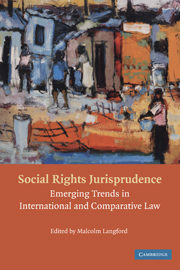Book contents
- Frontmatter
- Contents
- Foreword – Philip Alston
- Preface
- PART ONE OVERVIEW
- 1 The Justiciability of Social Rights: From Practice to Theory
- 2 The Challenges of Crafting Remedies for Violations of Socio-Economic Rights
- 3 The Right to Legal Aid in Social Rights Litigation
- PART TWO SELECT NATIONAL JURISDICTIONS
- PART THREE REGIONAL PROCEDURES AND JURISPRUDENCE
- PART FOUR INTERNATIONAL HUMAN RIGHTS PROCEDURES AND JURISPRUDENCE
- PART FIVE SPECIAL TOPICS
- Notes on Contributors
- Table of Authorities
- Index
- References
3 - The Right to Legal Aid in Social Rights Litigation
Published online by Cambridge University Press: 05 June 2012
- Frontmatter
- Contents
- Foreword – Philip Alston
- Preface
- PART ONE OVERVIEW
- 1 The Justiciability of Social Rights: From Practice to Theory
- 2 The Challenges of Crafting Remedies for Violations of Socio-Economic Rights
- 3 The Right to Legal Aid in Social Rights Litigation
- PART TWO SELECT NATIONAL JURISDICTIONS
- PART THREE REGIONAL PROCEDURES AND JURISPRUDENCE
- PART FOUR INTERNATIONAL HUMAN RIGHTS PROCEDURES AND JURISPRUDENCE
- PART FIVE SPECIAL TOPICS
- Notes on Contributors
- Table of Authorities
- Index
- References
Summary
INTRODUCTION
The right to legal assistance paid for by the State has primarily received endorsement in relation to the conduct of criminal litigation, particularly where an indigent accused confronts the potential deprivation of liberty. State-sponsored provision of legal services has not attracted parallel application to indigent litigants in civil proceedings, despite a possible adverse result – a ‘substantial injustice’ – due to the litigant's inability, essentially financial, to negotiate the judicial process.
In many jurisdictions where legal aid has been extended to civil proceedings, significant achievements have been made in the areas of consumer protection, social security, housing, family law, minority rights, public health and environmental protection. Indeed, it has been argued that the contraction of legal aid funding for civil cases by governments in recent years may be a consequence of these advances, coupled with budgetary concerns.
In a period when funding for civil legal aid has been severely cut and civil litigation by those least able to afford access to court accordingly curtailed, the emergence of economic and social rights has gained, and continues to attract, currency within a growing number of nations. However, in the absence of mechanisms to guarantee the effective protection of these rights, the promise of their actual enjoyment is diminished. The realisation of these rights, via their adjudication and enforcement, has raised the need for a legislative framework which facilitates their execution.
- Type
- Chapter
- Information
- Social Rights JurisprudenceEmerging Trends in International and Comparative Law, pp. 59 - 72Publisher: Cambridge University PressPrint publication year: 2009
References
- 1
- Cited by



